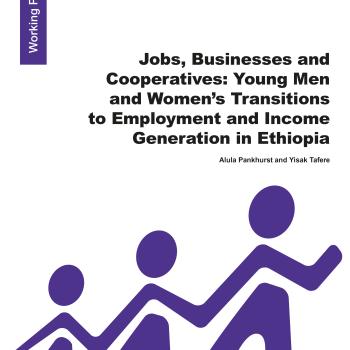Publication Information

In Ethiopia, agricultural development, industrialisation and private sector investment, along with government job creation initiatives, have brought about radical changes in the employment landscape. This working paper contributes to understanding the work of young men and women in different contexts, both in paid employment and when generating their own income.
Few young people found well-paid jobs related to their qualifications. Younger men and women were often still in education, though some worked part time. Wage labour included work in irrigated agriculture, on flower farms and in factories. However, pay was low and work conditions were hard and involved health risks, so young people tried to move on to better-paid employment or their own businesses.
Most young women and men were engaged in their own income- generating activities. However, only a few had successful businesses, often relying on family support and remittances from female relatives. Youth micro and small-scale enterprise (MSE) cooperatives in agriculture and cobblestone production were dominated by men. Despite some successful examples, the MSEs faced many challenges and most young people preferred to undertake their own work.
Community contexts and opportunities, family circumstances, and age, gender and education explain most of the variation and success in jobs and income generation. However, individual determination and ambition also made a difference.

In Ethiopia, agricultural development, industrialisation and private sector investment, along with government job creation initiatives, have brought about radical changes in the employment landscape. This working paper contributes to understanding the work of young men and women in different contexts, both in paid employment and when generating their own income.
Few young people found well-paid jobs related to their qualifications. Younger men and women were often still in education, though some worked part time. Wage labour included work in irrigated agriculture, on flower farms and in factories. However, pay was low and work conditions were hard and involved health risks, so young people tried to move on to better-paid employment or their own businesses.
Most young women and men were engaged in their own income- generating activities. However, only a few had successful businesses, often relying on family support and remittances from female relatives. Youth micro and small-scale enterprise (MSE) cooperatives in agriculture and cobblestone production were dominated by men. Despite some successful examples, the MSEs faced many challenges and most young people preferred to undertake their own work.
Community contexts and opportunities, family circumstances, and age, gender and education explain most of the variation and success in jobs and income generation. However, individual determination and ambition also made a difference.

